Nephrology Fellowship
The Nephrology Fellowship Program at Northwestern University Feinberg School of Medicine's Department of Medicine emphasizes clinical training in the diagnosis and treatment of renal diseases and hypertension and a basic understanding of renal physiology and pathophysiology. Fellows gain exposure to a wide variety of renal diseases during fellowship training. In the first year of subspecialty training, fellows spend nine months on the inpatient Nephrology Consultation Service at Northwestern Memorial Hospital.
About the Fellowship
Education
- Boot Camp: Daily lectures during the first five weeks of fellowship prepare new fellows for clinical service and overnight on-call coverage. Read a list of bootcamp topics.
- Core Lecture Series: Two-year, once-weekly didactic lectures on various topics in clinical nephrology. View our core lecture list.
- Renal Pathology: Monthly conference with renal pathologists focused on gaining competency in reading renal biopsies.
- Boards Review: Monthly sessions with nephrology faculty reviewing knowledge and practicing boards-style questions to prepare fellows for taking the nephrology specialty board examination
- Home Therapies Conference: Monthly series on topics in home dialysis (peritoneal dialysis and home hemodialysis).
- Quality Improvement: Quarterly meetings to discuss cases of near-miss or suboptimal outcomes and learn how and where changes in individual decisions or systems can be made to improve patient care.
- Renal Grand Rounds: Weekly conference with cutting-edge research presented by leading researchers and clinicians within nephrology from around the world.
Additionally, fellows learn by preparing presentations for:
- Journal Club: Fellows learn to critically read the current nephrology literature by presenting a recently published article, in conjunction with faculty guidance.
- Clinical Case Conference: Fellows present clinically relevant patient cases to the division, with attention to review of the literature, differential diagnosis, diagnostic tests and therapy.
Clinical Experience
First Year
Inpatient Rotations
ICU (MICU, SICU, CCU & Neurosurgical ICUs)
Fellows gain expertise in managing complex patients, including those on continuous renal replacement therapy (CRRT), extracorporeal membrane oxygenation (ECMO) and mechanical support devices such as ventricular assist devices and intra-aortic balloon pumps.
Acute Care
Fellows encounter diverse pathologies at Northwestern Memorial Hospital and Prentice Women’s Hospital, including acute kidney injury (AKI), glomerular diseases/vasculitides and electrolyte disorders.
End-Stage Renal Disease (ESRD)
Fellows manage dialysis and related complications for patients admitted to NMH.
Transplantation
Fellows co-manage kidney, kidney-liver and kidney-pancreas transplant patients with nephrologists and surgeons, providing care from pre-operative stages through discharge and rehospitalization when necessary.
Outpatient Continuity Clinic
Fellows see their own patients in a weekly general nephrology clinic at Northwestern, with cases discussed alongside a dedicated faculty preceptor assigned for the duration of the two-year fellowship.
Elective Weeks
Fellows spend six to eight weeks exploring various outpatient settings such as glomerulonephritis clinic, transplant clinic and home dialysis clinic. An additional four to six weeks are allocated for research, scholarly activities and areas such as pathology or pediatric nephrology.
Second Year
Inpatient Rotations
Jesse Brown VA Medical Center (6 weeks)
Fellows manage a broad spectrum of renal conditions, including ICU patients requiring CRRT, dialysis for ESKD patients and those needing new initiation of hemodialysis. Fellows consult for AKI, glomerular, electrolyte, or hypertensive disorders from general medicine, surgical or rehabilitation units.
Northwestern Memorial Hospital (6 weeks)
Fellows rotate through the same four services described in the first year.
Outpatient Clinics
Fellows continue following their patients in the Northwestern general nephrology clinic and rotate through the weekly VA nephrology clinic.
Outpatient Dialysis
Each fellow manages a cohort of in-center hemodialysis patients and rotates through the Home Dialysis clinic, overseeing a cohort of peritoneal and home hemodialysis patients monthly.
Elective Rotations
Fellows spend one to two weeks in each of the following ambulatory settings: glomerulonephritis clinic, transplant clinic, apheresis, interventional nephrology/vascular access clinic and renal pathology. Additional electives are available in palliative care, critical care medicine, interventional radiology and pediatric nephrology, based on the fellow’s interests.
Scholarly Activity
Second-year fellows are expected to develop a scholarly concentration through one of three tracks:
Clinical Research
Fellows conduct clinical research projects in their area of interest under the mentorship of a divisional faculty member.
Basic Science Research
Fellows participate in a basic science research project guided by a divisional faculty member.
Clinical Focus Area
Fellows choose a clinical area of focus (e.g., home dialysis, transplantation, glomerular diseases) and engage in enhanced clinical experiences and curricula with a faculty mentor, leading to a scholarly project.
Scholarly Expectations
Poster Presentation
Fellows present their research at the annual National Kidney Foundation, American Society of Nephrology or other national meetings.
Group Quality-Improvement Project
Second-year fellows initiate and lead a quality-improvement project, presenting their findings to the division at the end of the second year.
Publications
Fellows are strongly encouraged to publish a paper in a peer-reviewed journal.
Research Opportunities
Nephrology fellows have many opportunities to get involved in research and lead scholarly projects. Examples include:
- Working with faculty on existing or new clinical, basic or translational research projects
- Getting involved with recruitment and study visits for clinical studies
- Authoring a case report or a case series
- Leading quality improvement projects with the support of Academy for Quality and Safety Improvement (AQSI)
- Obtaining advanced training in clinical research through Masters in Clinical Investigation Program
Fellows interested in protected time for additional mentored research training can apply for a position on the Chicago KUH FORWARD TL1 training grant.
Our nephrology fellowship graduate, Rupal C. Mehta, MD, has gone on to receive career development awards to advance her research.
Leading the way in the discovery of kidney diseases, their pathogenetic mechanisms, and in the relentless pursuit of therapies to better the lives of the millions of worldwide CKD patients, many of our faculty are engaged in cutting-edge research, funded by the NIH and other sources.
Nephrology-Critical Care Track
In recognizing the interconnectedness and overlapping nature of nephrology and critical care medicine, we have collaborated with the Division of Pulmonary & Critical Care Medicine to create a combined training track in Nephrology-Critical Care. Our innovative training program is one of only a few across the country. In this integrated three-year track, fellows will complete two years of clinical nephrology training followed by one year of critical care training. Upon completion of the three-year program, fellows will be eligible for both nephrology and critical care medicine board certification.
Applicants interested in this training pathway should apply through the Nephrology program on ERAS and indicate interest in the Nephrology-Critical Care track. During interviews, invited applicants will meet with both nephrology and critical care medicine faculty. Applicants should preferentially rank the Nephrology-Critical Care track in their National Residency Matching Program Rank List, while also ranking the Clinical Fellowship track separately if they remain interested in the two-year general nephrology program.
Eligibility
- Applicant qualifications include successful completion of an ACGME-accredited residency and eligibility for the American Board of Internal Medicine's certification exam before the start of fellowship training.
- All applicants must be eligible for an unrestricted medical license before beginning training.
- If applicable, applicants must have valid ECFMG certification and a valid visa.
Application Process
For the academic fellowship year, applications for the Nephrology Fellowship are accepted exclusively through the Electronic Residency Application Service (ERAS). To apply, please go to the ERAS website and follow the directions for fellowship applicants. Applications and related documents submitted without the use of ERAS for this year will not be considered.
Interviews will begin at the end of August and extend through the first week of November.
To complete your application, the following documents are required:
- A letter of recommendation from your Internal Medicine Residency program director or department chairperson.
- Two to four additional letters of recommendation. These should be from clinical faculty and/or research mentors who know you and your work well. Ideally, at least one letter should be from a senior member of the faculty at your institution.
- A personal statement describing who you are, why you have chosen to pursue training in nephrology and your current thoughts about your future path.
- Your curriculum vitae.
- Original reports of your USMLE scores.
- Medical School dean's letters and transcripts are not required.
Since we participate in the National Resident Matching Program (NRMP) Medical Specialties Matching Program, fellowship applicants must also register with NRMP and plan to participate in the NRMP match.
Meet Our Fellows
First Year

Natalie Hobeika, MD
Undergrad: West Virginia University
MD: West Virginia University School of Medicine
Residency: Loyola University
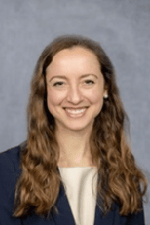
Virginia Hoch, MD, MPH
Undergrad: Northwestern University
MD: Northwestern University The Feinberg School of Medicine
Residency: Christiana Care/Thomas Jefferson University

Sean Mahoney, MD
Undergrad: The Ohio State University
MD: Florida International University Herbert Wertheim College of Medicine
Residency: Tulane University
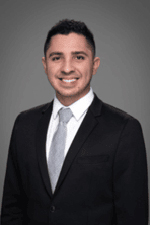
Richard Nieves Santiago, MD
Undergrad: 'University of Puerto Rico at Rio Piedras Campus"
MD: Ponce Health Sciences University School of Medicine
Residency: University of Illinois-Chicago

Jaya Parulekar, MD
Undergrad: Illinois Institute of Technology
MD: Wayne State University School of Medicine
Residency: Indiana University
Second Year

Pabitra Adhikari MBBS
Undergraduate: Arniko Higher Secondary School
Medical: Institute of Medicine, Tribhuvan University
Residency: St. Francis Hospital
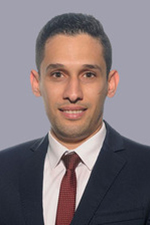
Awsse Al-Ani MBBS
Undergraduate: University of Mustansiryah
Medical: University of Medical Science and Technology
Residency: Medstar

Alexander Lanes MD
Undergraduate: Cornell University
Medical: Boston University
Residency: University of Miami
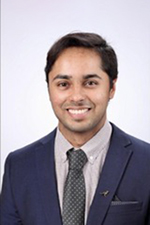
Akanksh Ramanand MD
Undergraduate: Tulane University
Medical: University of Queensland
Residency: Ochsner Clinic Foundation
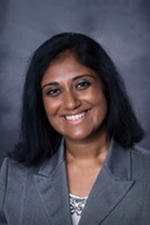
Prasanti Ravipati MD
Undergraduate/Medical: Drexel University
Residency: Tufts University
Nephrology - Critical Care

Aju Jose, MBBS
Undergraduate: Maulana Azad Medical College
Medical: Maulana Azad Medical College
Residency: St. Elizabeth's Medical Center
More Information
Learn more about the benefits of training at a world-class academic medical center in the vibrant city of Chicago. Further program details, including the Department of Medicine housestaff manual and a sample training contract, are available on our McGaw Medical Center Graduate Education site.
Renal Transplant Nephrology Fellowship (Advanced Fellowship Information)
We also recommend reading through our FREIDA listing (program number 148-16-21-058).